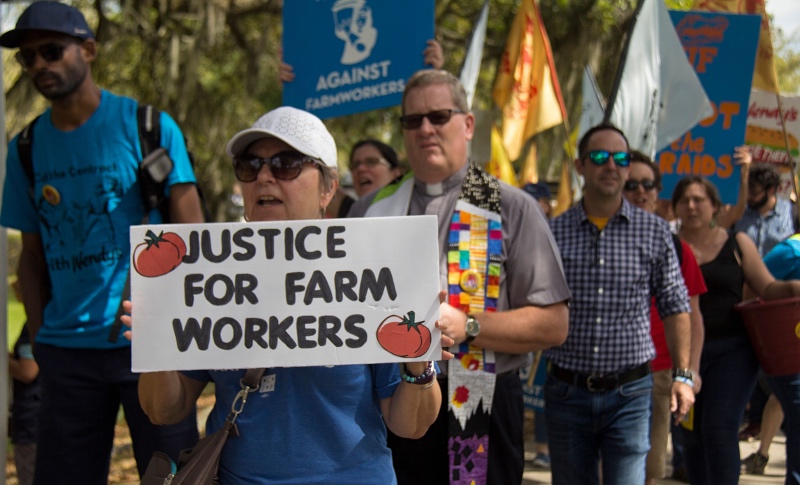
Two recent articles on Trian Partners and Wendy’s — set against the backdrop of Wendy’s stubborn Fair Food Program holdout — highlight Trian’s current dilemma: How to ride the growing wave of socially responsible investing while simultaneously, and quite publicly, turning its back on the most widely-respected and successful social responsibility program in the field today?
Two articles published just days apart last week cast a stark light on the challenge facing Trian Partners in the age of socially responsible investing (also known as “ESG” investing, an increasingly popular approach that gives significant consideration to a company’s track record with regard to environmental, social, and governance concerns). Taken together, and situated in the context of the ongoing Wendy’s Boycott, the articles paint a picture of a hedge fund giant attempting to plant its flag on the high ground of social responsibility while, at the same time, supporting Wendy’s indefensible stand against the leading social responsibility program in US agriculture. How Trian — the hedge fund run by Wendy’s Board Chair Nelson Peltz, and the single largest owner of Wendy’s stock — threads this particular needle may not only determine the future of thousands of workers in Wendy’s produce supply chain, but also that of the hedge fund itself, as 21st century investors increasingly seek partners with credible histories of socially and environmentally responsible business practices.
“A credible activist playbook…”
In an article published on the website Institutional Investor titled “Hedge Fund Activists Pivot to ESG,” Trian Partners was identified as one of a handful of hedge funds “adopting ESG-related issues as a focus”, citing Trian’s recent efforts to push “companies including GE, DuPont, and Danone to promote workplace diversity, adopt supplier codes of conduct, and reduce emissions and waste”. The article goes on to place this growing focus among hedge fund managers like Trian in the context of a broader, emerging interest among institutional investors in ESG issues (institutional investors — such as foundations and endowments, as well as union, corporate, and public pension funds — are a principal source of investment capital for hedge funds like Trian):
… The uptake of ESG issues by known hedge fund activists comes as more institutional investors incorporate environmental, social, and governance factors into their investment processes. A Callan survey of 89 U.S. institutional investors found that 42 percent had included ESG in their investment decision-making processes — almost double the proportion of investors who reported using ESG factors in 2013.
Cerulli, meanwhile, found that asset managers are anticipating high demand for ESG strategies from institutional clients over the next two to three years, with 98 percent expecting moderate-to-high ESG demand from endowments and foundations. Around four out of five asset managers expected similar levels of demand from public pension funds and hospital systems. (read more)
To translate this into a language spoken beyond the confines of Wall Street, here’s a breakdown:
1. Trian invests other people’s money to make more money, for both those other people and for themselves. That’s pretty much what Trian does.
2. Those other people that give Trian their money to invest are increasingly interested in how the companies where Trian invests their money treat people — including workers in their supply chains — and the planet.
3. Trian is responding to that increased interest by its current and prospective clients by positioning itself among a subset of hedge funds known to be focused on “ESG” issues.
The report goes on to note that other hedge funds are likely to follow suit, creating an increasingly competitive market. It ends on a cautionary note for funds looking to be considered a credible “activist” investor:
… Still, “the need for new activists to create a track record of success and a credible activist playbook may act as meaningful barriers to entry.”
In other words, as the market for ESG funds matures, companies like Trian are going to come under increasing pressure to prove to potential clients that they can not only talk the talk, but also walk the walk, of real social responsibility.
“Child labor laws exist to ensure that when young people work, the work does not jeopardize their health and well-being…”
Also last week, articles appeared in multiple papers across the country announcing the finding of child labor violations in dozens of Wendy’s restaurants by the US Department of Labor, including, as fate would have it, six Wendy’s franchised restaurants located within an hour of Immokalee (e.g., Miami Herald, “Owner of Wendy’s in Florida and 8 other states owes $157,000 for child labor violations“):
Child labor violations involving 446 minors employed at Wendy’s or Fazoli franchise restaurants will cost a Louisville company $157,114, the U.S. Department of Labor has announced…
… Labor’s Wage and Hour Division investigators found workers ages 14 and 15 who worked before 7 a.m. or after 7 p.m. on school nights, and worked more than three hours on a school day and/or eight hours on an off day.
None of the above is allowed by the Fair Labor Standards Act.
“Child labor laws exist to ensure that when young people work, the work does not jeopardize their health and well-being or educational opportunities,” said Wage and Hour Division District Director Karen Garnett-Civils, in Louisville. “We encourage all employers to review their employment obligations and to contact the Wage and Hour Division for compliance assistance.”
For anyone following the twists and turns of the four year-old Wendy’s Boycott, the finding of widespread child labor violations in Wendy’s restaurants begs the question: If Wendy’s can’t ensure compliance with mandatory labor laws like limitations on child labor in its own stores, how in the world can it ensure compliance with laws protecting farmworkers — including laws prohibiting sexual harassment and assault, forced labor, and wage theft, not to mention child labor — on far away farms at the distant reaches of its supply chain?
The answer is simple: It can’t, and any claims to the contrary are nonsense.
No code of conduct, no annual audit, and no flowery assertions of good corporate citizenship can change the simple fact that real compliance requires certain essential mechanisms for monitoring and enforcing workers’ rights, mechanisms that include worker leadership in drafting the standards, a 24-hour complaint investigation and resolution process, market consequences for non-compliance, and legally-binding agreements with buyers that provide for the market consequences when those standards are violated. Without those mechanisms, any claims of transparency down the supply chain are baseless; and any hopes of protecting workers’ human rights in the fields are futile, plain and simple.
And that is exactly why Wendy’s must join the Fair Food Program, now. The Fair Food Program stands alone in employing all the necessary mechanisms for meaningful labor rights monitoring and enforcement. That is a clear and ascertainable fact. If Trian hopes to make any credible claim of being a leading ESG fund, it must end Wendy’s opposition to the only social responsibility program proven to stop the abuses that have plagued our country’s fields for generations. For Trian, with its significant ownership of Wendy’s stocks and its multiple personnel in leadership positions on Wendy’s Board of Directors, Wendy’s sins are its own. Whatever good Trian might do with other companies in its portfolio, Wendy’s refusal to join the rest of the fast-food industry in supporting the gold standard in social responsibility will remain a glaring, inexplicable contradiction.
Good Done Right…
We’ll leave the last word in today’s post to Wendy’s CEO Todd Penegor.
As it happens, in the very same week that the Institutional Investor and child labor articles hit the headlines, Wendy’s released its 2019 Corporate Social Responsibility Report, in which Wendy’s CEO declared:
“At Wendy’s, we believe that doing the right thing is the only way to do business,” said Todd Penegor, President and Chief Executive Officer of The Wendy’s Company. “Being a responsible corporate citizen is a priority for our brand, and Good Done Right is our way to communicate how we’re advancing various commitments to make a positive impact in the areas of food, people and our environmental footprint.” (read more)
One iron-clad rule of business — socially responsible business or otherwise — is this: Do not promise what you cannot deliver. The gap between expectations and reality is the potential energy that drives social change. When our founding fathers declared “All men are created equal” and simultaneously protected the benighted institution of chattel slavery, it drove conflict, and change, for more than two centuries — from the Civil War to women’s suffrage to the Civil Rights Movement.
Contradictions drive conflict. Conflict drives change.
Though it is still very much an emerging market, the same rule will hold for the ESG investment sector. In the words of the Institutional Investor, “the need for new activists to create a track record of success and a credible activist playbook may act as meaningful barriers to entry.”
In the words of everyday people, talk is cheap. The bigger the gap between your stated principles and your actual business practices, the quicker the ESG market will compel you to close that gap, or spit you out. The same foundations and union pensions pouring money into ESG investments are divesting just as quickly from bad actors when they refuse to correct their course.
It’s time for Wendy’s to join the Fair Food Program. Join us in New York City on March 10-12 for the Follow the Money March to bring the final fast-food holdout into the Fair Food fold.


